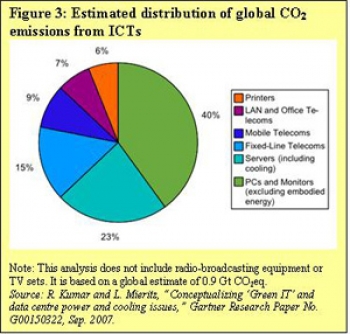In short, Google U.S. alone is emitting the same quantity of CO2 every year as 28,823 average U.S. homes.
 “Your guide to financial planning & socially responsible investing”
“Your guide to financial planning & socially responsible investing”
By: Judith L. Seid, CFP ®
President, Blue Summit Wealth Management
July 23, 2010 (La Mesa) -- You may never have given it much thought, but the amount of energy needed to maintain the billions of web pages on the internet is rising, with an increasing carbon emissions footprint of around 10-percent each year - on track to soon surpass the air travel industry!
To gain some perspective on this trend, Harvard University physicist Alex Wissner-Gross has suggested that just two Google searches requires the same amount of energy as boiling a kettle of water. Further calculation equates the same amount of CO2 generated from the electricity produced to power the average U.S. home for a full month, as 3.1 million Google searches which, according to Search Engine Land, occurs approximately every 1.5 minutes (Google logs somewhere around 3 billion searches per day – wow!).
 In short, Google U.S. alone is emitting the same quantity of CO2 every year as 28,823 average U.S. homes. Although the exactness of these claims has been debated, the bottom line is that as internet use grows and grows, it becomes more and more important to take a look at how information and communication technology companies can help mitigate carbon emissions.
In short, Google U.S. alone is emitting the same quantity of CO2 every year as 28,823 average U.S. homes. Although the exactness of these claims has been debated, the bottom line is that as internet use grows and grows, it becomes more and more important to take a look at how information and communication technology companies can help mitigate carbon emissions.
The Information and Communication Technologies (ICT) sector, which encompasses all devices that transmit, process or store information, has been noted as a key area of the economy that could contribute significantly to reducing GHG emissions.
With the ICT sector experiencing rapid growth, particularly in developing nations, its influence (as well as its own carbon footprint) also becomes greater. With proper leadership and support, ICT could use this position of power to carry the economy towards substantial sustainability improvements.
The way we see it, there are two important ways in which the ICT sector could catalyze this positive change. First, they could employ state of the art sustainability technologies during this period of rapid growth within their own sector. For example, by embracing and utilizing green building principals, the construction of new ICT infrastructure and the operation of current ones could be streamlined for efficiency. Second, since ICT devices are used by nearly all sectors of the global economy, the development and widespread distribution of highly efficient, energy-saving ICT devices could allow everyone to accomplish more with less, thus taking some weight off of our overburdened globe.
According to a 2008 report by McKinsey & Company, this action alone could assist other industry sectors to reduce emissions by 7.8 metric gigatons by 2020.
Recently, there’s been solid leadership from ICT corporations to take advantage of this opportunity for environmental stewardship.
Google has begun addressing these issues, having spent have spent $2.3 billion to develop sustainable technologies and infrastructure. As discussed by The Green Economy Post, Cisco Technologies has ranked first in a study conducted by the environmentally critical Greenpeace organization followed by Ericcson, IBM and HP.
Greenpeace employed three criteria to evaluate IT companies in their study.
1. How IT companies are using technology to induce economy-wide climate change solutions.
2. How IT companies themselves are mitigating their environmental impact and
3. The companies engagement in advocating and supporting policies that promote energy efficiency and emission reduction.
At the U.N. Climate Change Conference in Denmark, Cisco stated their forward-thinking intentions to, “…reduce our own carbon footprint by 25% by 2012 as well as to enable smart buildings, smart grids, and smart cities that will help reduce emissions globally.”
Although IT solutions have been making a noticeable difference in global climate change reduction, Greenpeace states that there is still, “…significant room for companies to further demonstrate climate solutions and provide specific metrics for new solutions development.” As we continue to move ahead economically, while trying to minimize impacts to our natural environment, it seems that IT breakthroughs could allow our world to accomplish a lot more with a lot less.
So next time you turn on your computer and do a search, please remember, that too has an impact.
And please remember to turn off your computer when you are not using it.
Judith L. Seid, President and founder of Blue Summit Wealth Management, Inc, is a Certified Financial Planner who has actively used Socially Responsible Investing (SRI) for her clients since 1992. She firmly believes that “We can influence corporations to change their policies by avoiding investments in irresponsible companies and by seeking investments in companies with positive practices and products.” Socially Responsible Investing (SRI) exists for investors looking to use the power of financial investment to create sustainable social change.
For more information on Sustainable Investing, contact Judith at Blue Summit Wealth Management in La Mesa, (619) 698-4330; www.BLUESUMMITWEALTH.com.
Securities offered through Pacific West Securities, Inc. (Pacific West) Member FINRA/SIPC. Advisory services provided through Pacific West Financial Consultants, Inc. and Blue Summit Wealth Management, Inc. (Blue Summit), Registered Investment Advisors. Blue Summit and Pacific West are not affiliated.








Recent comments